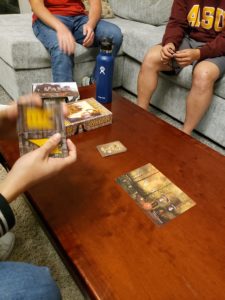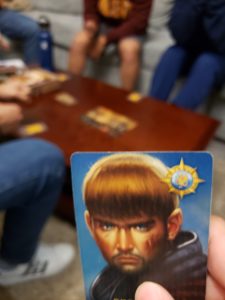

For our first critical play, my friends and I played Avalon. Avalon, a spinoff of The Resistance, which was created by Don Eskridge, is a board game — and since one of us owned the board game, we played in person instead of online.
The target audience is a group of people who like logic deduction, strategy, team play, or possibly role playing. Because of the strategic elements, the target audience is not younger kids and probably not families; but college students, whether an already-established friend group or a group of relative strangers, would be a good fit for the game.
Now for the Formal Elements of the game: we played with 7 players, but the game could be played with between 5 – 10 players. Each turn, the player whose turn it is could choose a team to complete a task, and the “good” players aim to “succeed” the tasks while the “bad” players aim to fail them. It’s a team vs team game, but there are special roles within each team such as Merlin and Percival, which change the player dynamics within the team — in this case, while both roles are on the “good” team aiming to “succeed” the tasks, Merlin has the added objective of guiding the “good” team without being obvious about it and Percival has the added objective of being Merlin’s “voice.” There are other roles in the game as well that I won’t go into here. These additional objectives makes the player relationships interesting because there are lots of bluffing and double-bluffing that could happen, and it goes from a straightforward social deduction game to one where players are sometimes rewarded for being taciturn or intentionally acting suspicious.
Avalon is obviously very similar to The Resistance, being an offshoot of it. The theme of King Arthur gave it a more fantastical element, but since the role playing element was very much secondary to the strategic elements, I don’t think Avalon is better or worse than The Resistance. Compared with games like Deception and One Night Werewolf, which are also social deduction games, and also team vs team games, I think Avalon has the advantage of having the fewest rules and roles. There is less of a chance a new-comer messes up (with Werewolf, I have experienced multiple people forgetting what their role was or “wake up” at the wrong time). Also, unlike Deception, no player needs to “sit out” and only give clues without participating in the deduction component. So, personally, I like Avalon more than Deception and equally as much as Werewolf.
The game was definitely fun. It was hard to follow people’s line of reasoning at first, or to know how to vote at the start of the game when no one had any clues about who might be “good” or “bad,” but that made it challenging, and even more rewarding when I started to get the hang of it. It also made for fun social dynamics, because sometimes I needed to figure out whether someone was talking a lot because they were a special role or because they were naturally more outspoken. So this game was fun for me primarily because it was challenging.
There was a moment of particular failure in our game. That was when the player for Morgana forgot that he needed 2 fails for the 4th task instead of the usual 1 fail. He had to backtrack some of his plays, which initially didn’t arouse too much suspicion, but when that mission failed and we started discussing who the potential Morgana could be, he became a prime suspect. This gave the “good” team an advantage. But because of the roles of Merlin and the Assassin, the game was not yet over, since the “bad” team still has a chance to win, which is one of my favorite aspects of Avalon.
Because of the moment of failure above, I would change the game so that the “Needs 2 to fail” messaging is much more clear. This might look like an explanation of this feature closer to the start of the rulebook, or a clearer indication of the feature on the board itself. Additionally, I found that we had several pauses during the game when people were about to vote, then one person said something and we went back to discussing. So a time limit for discussing who to send on missions might also make the game flow more consistent and continuous.



